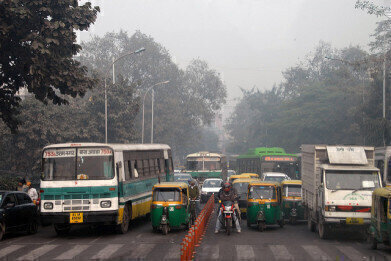Air Clean Up
What Is Car Rationing?
Dec 28 2017
Car rationing is the practice of only allowing a specific number of cars on the road in major urban centres on any given day, in a bid to alleviate damaging pollution levels. Normally, the authorities specify that all number plates ending in odd and even digits can only use roadways on alternating days, thus theoretically cutting the number of active vehicles in half.
The measure was brought into action last month in the Indian capital of Delhi in order to try and curb the city’s terrible air quality problems. It is the third time the Delhi government has resorted to car rationing to address their pollution crisis, though when it was initially trialled in 2016, experts were divided on its efficacy.
A “gas chamber” of a city
India as a whole and Delhi in particular have struggled with air quality issues for several years now, with the country’s capital consistently ranking among the most polluted metropolises on the globe. At times, levels of particulate matter (PM) and other noxious toxins have soared to more than 30 times the recommended “safe” limit as defined by the World Health Organisation (WHO).
The growing market for continuous emissions monitoring systems (CEMS) in developing countries has seen awareness of the issue grow in recent years, and the city’s Chief Minister Arwind Kerijiwal drew headlines earlier this year when he called Delhi a “gas chamber”.
The problem becomes particular troublesome in winter, due to the fact that many rural farmers in states neighbouring the capital (such as Haryana and Punjab) burn the crops in their fields to clear away the stubble for the next year’s sowing, despite the practice being illegal. The combustion of waste inside Delhi and the proliferation of fireworks during festivals such as Diwali also contribute to the problem, as do low wind speeds and dust blown around from construction sites.
The jury’s still out
The car rationing scheme was initially trialled in Delhi in January 2016 and then again in April of the same year, though commentators are in disagreement about how effective it was in actually curbing pollution. While some were critical of its impact on the environment, all agreed that it did at least serve to massively reduce the congestion which routinely plagues the city.
Despite the dubious effect it had, the government decided to reintroduce it last month between the 13th and the 17th of November, in the hope that it would go some way to addressing the city’s dire air quality. Kerijiwal has indicated that the scheme is just one of several measures the government plan to take in order to improve air quality and reduce transport-related pollution.
Other initiatives include prohibiting construction on particularly poor days and increasing parking fees in the capital to encourage people to us public transport instead of driving their own cars.
Events
Apr 22 2024 Hannover, Germany
Apr 23 2024 Kuala Lumpur, Malaysia
Apr 24 2024 Sao Paulo, Brasil
May 05 2024 Seville, Spain
May 13 2024 Munich, Germany














